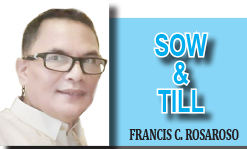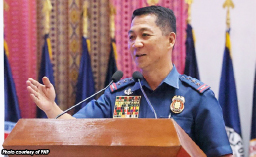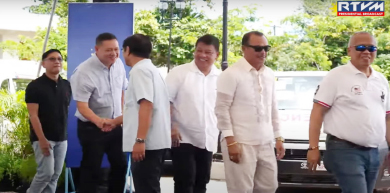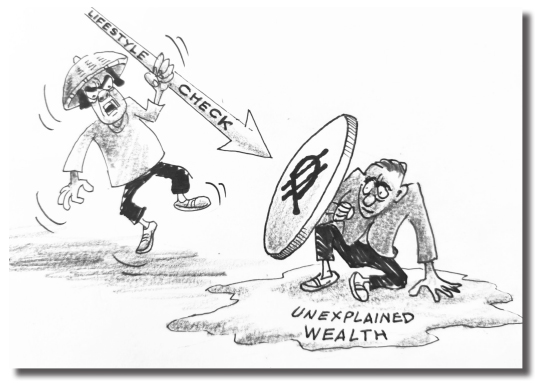
Agriculture is our wisest pursuit, because it will in the end contribute most to real wealth, good morals, and happiness.” – Thomas Jefferson
Categorically, I could say without fear of contradiction that our farmers have the most important and noble profession of all time.
They are definitely needed every single day of our lives.
Mankind continuously exists because of the hands that provide us foods.
This is the very reason why every nation, every government for that matter, invest largely in its pursuit of attaining food security. A must for every responsive government to ensure that there will be no food shortage and its citizenry will not go hungry. Otherwise, societal instability, chaos, and ultimately widespread hunger will prevail.
Hence, you will probably notice that our government through the intercession of the Department of Agriculture and other allied agencies are doing their damned best to motivating the farmers to keep going and produce more food not only for their own family consumption, but if possible, for other people in the community as well.
So, one thing’s for sure: Filipino farmers need training, they need access to technology, and they need better logistics systems that will allow them to transport their produce to the marketplace at a lower cost.
While it is true that our government could not easily change the mindset of Filipino Farmers – from being ordinary food producer to become a progressive entrepreneur, there is a non-stop provision of program interventions that include free high quality seeds, fertilizer, irrigation water, farm equipment or machineries, among others.
Apart from the abovementioned services or interventions the government proactively support individual or farmers group through the conduct of a series of
Enterprise
Development Trainings, for farmers to transform their farming operations into sustainable, profitable, and competitive businesses, improving their livelihoods and contributing to the overall growth of the agricultural sector.
Usually, a capability development education seminar or training is given to those who want to widen up his/her knowledge and skills in agribusiness enterprise.
Just last week, a 3-day Enterprise Development Training was conducted at the Avenue Hotel, Marasbaras in Tacloban City.
This was organized by DA-RFO 8 through AMAD’s Agribusiness Promotion Section – one of the operating units of DA responsible for equipping the farmers – whether start-ups or already engaged in micro, small, or medium livelihood activities.
Farmers need to learn the ropes of innovative ideas or tools to further improve their business acumen by adopting some basic management skills, such as these:
1. Better decision-making: helps farmers develop business planning, financial management, and risk management skills.
2. Increased efficiency: Farmers learn to optimize resources, reduce costs, and improve productivity.
Enhanced Market
Access and sharpen their competitive edge thru:
1. Market analysis: This helps farmers understand market trends, consumer preferences, and competitor analysis.
2. Value-added products: Farmers learn to create value-added products, increasing their marketability resulting in the creation of a market niche.
Increased Income and Profitability:
1. Diversification: This introduces farmers to new crops, products, or services, reducing dependence on a single (most often seasonal) commodity.
2. Financial literacy: They need to learn to manage their finances, access credit, and make informed investment decisions.
Sustainability and Resilience:
1. Sustainable practices: Training promotes environmentally friendly and socially responsible farming practices.
2. Risk management: They learn to mitigate risks, such as climate change, pests, and diseases.
Networking and Collaboration:
1. Partnerships: their exposure to trainings facilitates connections with other farmers, buyers, and stakeholders. A farmer should not rely on middlemen or traders, but should know to market his product directly to institutional buyers.
2. Knowledge Sharing: Farmers exchange experiences, best practices, and innovative ideas.
By attending in Enterprise Development Training, farmers can transform their farming operations into sustainable, profitable, and competitive businesses, improving their livelihoods and contributing to the growth of the agricultural sector.
Moreover, they are encouraged to take action, and if possible, think global. Modesty aside, compared to our neighboring countries, Filipinos, could stand tall and feel proud of our innate talents. Studies have shown that ordinary Filipino farmers are perceived to have high literacy and can confidently speak or communicate in English with any foreign visitors.
Perhaps, it’s about time that we think of the future for our country’s agriculture sector for the sake of the next generation, by doing the best we can, and make our mark.
The entire activity goes further than just mere skills training provision. It was purposively designed to catalyze the creation of livelihood enterprises that shall be implemented by the trainees, immediately after the training.
Remember that every successful entrepreneur started with a dream, faced challenges, and persevered. In the end, truly build and contribute real wealth, good morals, and happiness as what the late Sir Thomas Jefferson once said.








